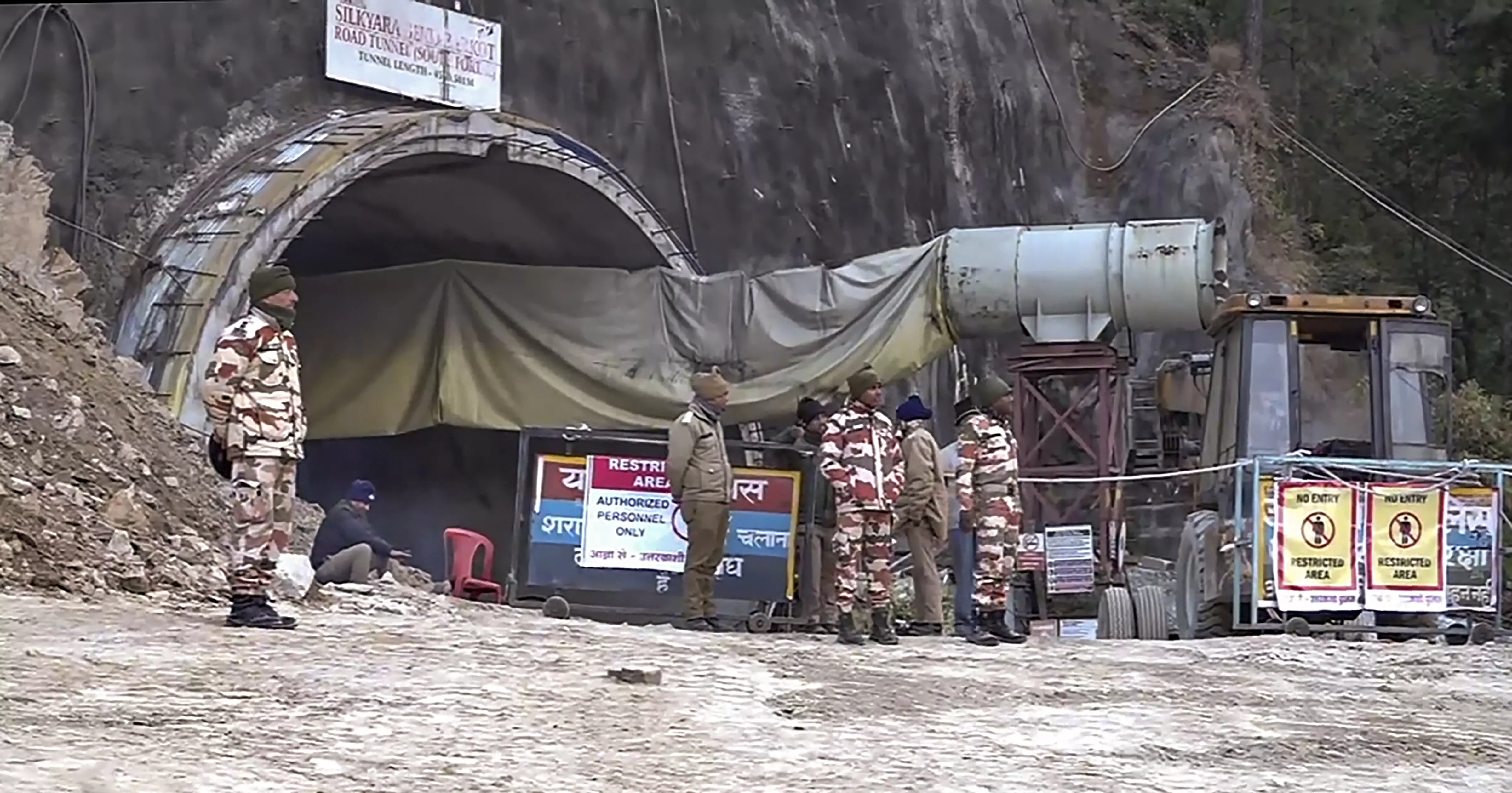
Security personnel outside the under-construction tunnel between Silkyara and Dandalgaon on the Brahmakhal-Yamunotri national highway, days after it collapsed trapping several workers inside, in Uttarkashi district, Thursday, November 16. Photo: PTI
Uttarkashi tunnel collapse: Survivors would need physical, mental rehabilitation, say doctors

New Delhi, Nov 16 (PTI) The workers trapped in the collapsed under-construction tunnel in Uttarakhand would need both physical and mental rehabilitation upon being rescued, doctors advised.
The operation to rescue 40 workers trapped in the under-construction tunnel on the Char Dham route entered the fifth day on Thursday.
The labourers are safe, and oxygen, electricity, medicines, food items and water are being constantly supplied to them through pipes, officials said on Wednesday.
This incident could be traumatic for the survivors as they are likely undergoing mental strain along with physical stress, doctors said.
"It's a very traumatic event and their current mindset would be very apprehensive, filled with uncertainty about their future and their survival. They could be feeling fearful, helpless, traumatized and frozen in time. They might not be able to really process things," said Dr Archana Sharma, consultant clinical psychologist at Sri Balaji Action Medical Institute, Delhi.
The victims might also experience panic attacks because of being trapped in closed spaces for long, said Dr Ajay Agarwal, director, Internal Medicine, Fortis Hospital, Noida.
"Further, the ambient conditions such as oxygen and carbon dioxide levels too could impact their physical health and prolonged exposure to cold underground temperatures could possibly cause hypothermia and make them fall unconscious," Agarwal told PTI.
Hypothermia is a condition in which the body fails to regulate its temperature in response to external temperatures and begins to lose heat faster than it is produced. Therefore, body temperatures plummet to subnormal levels.
"As all the workers are collectively breathing in a closed space, carbon dioxide levels can heighten, exacerbating breathing problems," said Dr Ajay Kaul, chairman, Cardiac Sciences, Fortis Hospital, Noida.
"Lack of oxygen inside the tunnel can lead to asphyxia (suffocation) and that's a serious problem," Kaul said.
He added that the injuries from the fallen debris can lead to potential fractures and wounds. Further, because of the surrounding unhygienic condition, the risk of infection in these wounds can worsen.
Agarwal said the situation might worsen for the workers who have chronic health problems, such as diabetes or heart disease, even as the regular supply of food and water might sustain them physically and prevent dehydration.
"Having a coronary heart disease can be fatal as being unable to withstand such a stress, one can have a heart attack. However, generally speaking, incidents of such diseases in manual labourers is less," said Kaul.
The regular food and water supply, along with physically supporting the trapped victims, is likely to provide them with a psychological boost and send a message that "help is not far", the doctor said.
"This could reduce anxiety levels and decrease the chances of ketosis," he added.
Ketosis is a natural metabolic state that one's body enters during starvation.
Upon being rescued, the victims would need to be checked for dehydration or hypothermia, for which they might require treatment, Agarwal said.
However, the incident is highly likely to cause them mental trauma, for which the workers would need to undergo psychological tests and counselling, along with physical fitness tests, said psychologists.
Once rescued, the survivors might suffer trauma and therefore, would need "psychological first-aid", said Sharma.
"This is a type of experience that has a huge potential to shape one's world view, thoughts about themselves and even has the potential to change one's personality," said clinical psychologist and therapist Dr Debalina Bhattacharjee.
"A sense of safety and emotional support from the community, from the people around them and from their families is very crucial at this stage for recovery," Bhattacharjee said.
She also said that the workers should be given the time and space to process the trauma.
"It is important not to hurry the process and to give them the time to settle down. Continued psychological support is important at a pace that they are comfortable with," she added. PTI

